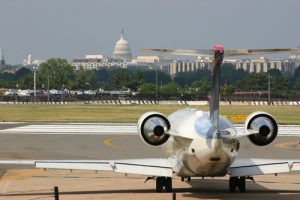
With American transportation legislative changes in the air, U.S. Reps. Barbara Comstock (R-VA) and Evan Jenkins (R-WV) and U.S. Sen. Shelley Moore Capito (R-WV) want Congress to maintain the slot status quo at one of the international airports serving the Washington, D.C., metropolitan area.
In a bipartisan, bicameral April 10 letter sent to eight congressional leaders, the lawmakers said Congress already has loosened the Federal Aviation Administration’s (FAA) so-called slot rule to the point of creating “significant congestion and stress” at Ronald Reagan Washington National Airport, the Arlington, Va.-based commercial, international airport nearest Capitol Hill. The legislative changes also are partially responsible for having the reverse effect on Northern Virginia’s other major airport, Washington Dulles International Airport.
“We write to make clear our strong opposition to any attempts at changing the current High Density (“slot”) and perimeter rules” at Reagan National, according to the letter, which includes signatures from 16 other members of Congress, including U.S. Rep. Joe Manchin (D-WV) and U.S. Sens. Mark Warner (D-VA) and Tim Kaine (D-VA).
Slots are limits or authorizations on when flights may take-off or land and they’re used in the United States and around the world to manage air traffic at extremely busy airports, according to the FAA. In the United States, the FAA uses runway slots to limit scheduled air traffic at three capacity-constrained airports: Reagan National and New York’s John F. Kennedy International Airport and LaGuardia Airport.
“However, changes by Congress to the slot rule in 2000, 2003, and 2012, have disrupted the system’s balance,” the lawmakers wrote, referring to the operational stability among the D.C.-metro region’s three major airports, which also includes Baltimore-Washington International Thurgood Marshall Airport in Baltimore.
For instance, since 2000 there has been a 50 percent growth in domestic commercial passenger traffic at Reagan National, while the same traffic has declined by 9 percent at Dulles International, according to the lawmakers. “The decline at Dulles International is, in part, attributable to changes made by Congress to the operational rules at Reagan National,” they wrote.
To further overburden operations at Reagan National by adding more flight traffic and slots “could financially destabilize Dulles International,” the lawmakers pointed out. No one wants to see that happen because Dulles International is already carrying massive debt to the tune of more than $4 billion, they said.
“Further complicating the repayment of this debt is the decrease in the number of airlines and passengers, the culmination of which makes Dulles International more expensive and thus less competitive,” the letter states. “History has shown that increasing slots, changing aircraft utilization or expanding the perimeter results in local and regional economic volatility as well as increased aircraft.”
The lawmakers requested that congressional leaders avoid making any changes to these specific slot rules as they continue consideration of FAA reauthorization, U.S. Department of Transportation funding, or a potential nationwide infrastructure package.
The lawmakers also acknowledged that while “no member of Congress appreciates another representative meddling with the assets in their state or district,” they wanted to state their strong objection to “any attempts by other members to dictate operations at these airports for their own personal convenience at great cost to our communities and constituents.”
“We have seen in past debates that proposals to significantly change the slot and perimeter rules have threatened to derail the entire FAA reauthorization process,” they wrote. “We would all be better served by avoiding repetition of this debate so that all members may focus on true issues of national importance.”



